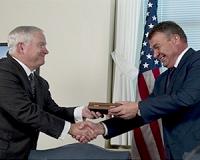| . |  |
. |
Washington (AFP) Sept 15, 2010 Defense Secretary Robert Gates on Wednesday hosted his Russian counterpart Anatoly Serdyukov in a high-profile visit symbolizing a "reset" in US-Russia ties. Both men vowed to expand military cooperation as they marked the first visit to the Pentagon by a Russian defense minister in more than five years. The full-day of talks reflected how relations between the former Cold War foes have improved since President Barack Obama took office, with the two sides forging common ground on the war in Afghanistan and nuclear arms control, officials said. But Washington and Moscow still have serious disagreements on major issues, including a US plan to build a missile defense system in Europe. Serdyukov told reporters the sensitive issue came up in talks but gave no indication if Moscow might be ready to join in the anti-missile network, which Washington says is aimed at thwarting a possible attack from Iran. "I would not say there was any breakthrough in this discussion," a senior US defense official told reporters. Serdyukov supported having experts from both countries hold further talks on the issue, said the US official, who spoke on condition of anonymity. Gates and Serdyukov signed two documents designed to deepen military ties, including a memorandum on cooperation -- replacing an outdated 1993 accord -- and a plan to form a defense working group. The memorandum "underscores that defense cooperation is an important element strengthening the wider US-Russian relationship, especially now when our two countries confront many similar security threats and challenges," Gates said at the signing ceremony. Serdyukov said he hoped his visit "will provide a very powerful impetus to the development of the relationship between our nations." Washington is keen to maintain a deal agreed with Russia last year that allows the US military and NATO to move troops and supplies across Russian territory for the war in Afghanistan. The deal has eased the pressure on supply routes through restive areas in Pakistan, now affected by devastated floods, and Gates expressed appreciation for Russia's assistance, officials said. Russia allows both lethal and non-lethal cargo on US military flights over its territory, but prohibits the Americans from moving weapons along rail lines. US officials have discussed the possibility of Russia allowing lethal cargo on its railway network, but there was no sign Serdyukov hinted at a change in Moscow's policy. The US has also struck deals with countries across Central Asia to allow access to air fields and supply lines for the mission in Afghanistan, moves that have caused friction with Russia. The Russian daily Nezavisimaya Gazeta, citing defense ministry sources, said on Wednesday the Kremlin expected Serdyukov to discuss the "division of spheres of influence" in central Asia and the south Caucasus during his visit. After three formal meetings, Gates and Serdyukov were due to hold a working dinner on a US Navy vessel on the Potomac river, Pentagon press secretary Geoff Morrell said. With the Pentagon rolling out the red carpet for Serdyukov, analysts said the visit demonstrated the two governments were serious about strengthening ties. "As a signal of the 'reset,' having the defense ministers meet is huge," said Olga Oliker, senior international policy analyst at the Rand Corporation think tank. "Historically this is how countries show they trust each other," with military exercises and high-level talks, Oliker told AFP. On the eve of the visit, Gates -- a former CIA director who spent much of his career battling the Soviets -- described Russia as a partner in an interview with the Russian agency Interfax. "I don't see Russia as a threat," Gates said. "We're partners in some areas and competitors in others. But on important things, we are cooperating," he said. Gates saw "a much greater opportunity for military exercises" and said the administration wanted to buy Russian MI-17 helicopters for Afghan security forces, despite some opposition from US industry. In Wednesday's talks, the Pentagon chief also briefed Serdyukov on efforts persuade the US Senate to ratify the new Strategic Arms Reduction Treaty (START). The START deal has bolstered cooperation on national security issues, paving the way for Moscow to support tough UN sanctions against Iran over its nuclear program, US officials said.
Share This Article With Planet Earth
Related Links Learn about the Superpowers of the 21st Century at SpaceWar.com Learn about nuclear weapons doctrine and defense at SpaceWar.com
 US, Russian defense chiefs promote deeper ties
US, Russian defense chiefs promote deeper tiesWashington (AFP) Sept 14, 2010 US Defense Secretary Robert Gates and his Russian counterpart Anatoly Serdyukov vowed to expand military cooperation on Wednesday, in a sign of improving relations between Moscow and Washington. In the first visit to the Pentagon by a Russian defense minister in five years, Serdyukov was greeted with military pomp before heading into a full day of talks with Gates. The high-profile visit ... read more |
|
| The content herein, unless otherwise known to be public domain, are Copyright 1995-2010 - SpaceDaily. AFP and UPI Wire Stories are copyright Agence France-Presse and United Press International. ESA Portal Reports are copyright European Space Agency. All NASA sourced material is public domain. Additional copyrights may apply in whole or part to other bona fide parties. Advertising does not imply endorsement,agreement or approval of any opinions, statements or information provided by SpaceDaily on any Web page published or hosted by SpaceDaily. Privacy Statement |